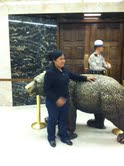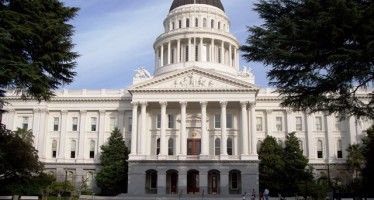Judge OKs Gerawan worker suit against ALRB

 A historic lawsuit against California’s Agriculture Labor Relations Board is set to move forward. Brought by workers at Gerawan Farms, the suit alleged that the ALRB has violated the workers’ First Amendment right to freedom of association and their 14th Amendment right to due process of law. The workers’ revolt was led by Silvia Lopez, a 15-year Gerawan employee (pictured nearby outside Gov. Jerry Brown’s office).
A historic lawsuit against California’s Agriculture Labor Relations Board is set to move forward. Brought by workers at Gerawan Farms, the suit alleged that the ALRB has violated the workers’ First Amendment right to freedom of association and their 14th Amendment right to due process of law. The workers’ revolt was led by Silvia Lopez, a 15-year Gerawan employee (pictured nearby outside Gov. Jerry Brown’s office).
Pending a seemingly interminable ALRB investigation into the employees’ vote to decertify the United Farm Workers as their union representative, the ballots from that election were impounded and kept secret by the ALRB. The ALRB, meanwhile, seized the opportunity to appoint a mediator tasked to unilaterally draw up a new contract between Gerawan and its workers.
According to California law, that contract is enforceable regardless of the wishes of the employer, in this case Gerawan. What is now at stake is whether such a contract can be imposed against the wishes of employees — whose interests the ALRB was created to protect during the Cesar Chavez-era of the 1970s.
According to U.S. District Court Judge Lawrence J. O’Neill, that is a matter that ought to be settled in the courts. In a recent ruling, he held that the lawsuit will move to trial. The ALRB had filed a motion to dismiss the workers’ suit. Although O’Neill agreed that the portion of the suit arising from their 14th Amendment claims should not proceed, he gave the First Amendment claims a green light.
A landmark controversy
The extraordinary case, pitting one of California’s biggest agricultural employers against one of its most famous — but struggling — unions, has put a dramatic twist on the typical controversies between organized labor and large businesses. After decades spent developing a close working relationship with Gerawan management, workers rebelled at the efforts of United Farm Workers.
The adverse reaction stems from a decades-long tale of unusual behavior toward Gerawan by UFW. In 1990, Gerawan workers voted in the UFW as their labor representative. Two years later, that vote was certified. But after engaging in negotiations with Gerawan, the UFW chose to walk away — disappearing from the scene without securing a new labor contract.
Not until 2012, after its membership had plummeted by tens of thousands statewide, did the UFW return, demanding to pick up where it had left off. Because of California labor law, Gerawan was obliged to acquiesce in the union’s demands and resume contract negotiations. Once again, however, the process did not advance quickly. Rather than walk away again, the UFW went to the ALRB.
Specifically, the UFW asked the ALRB to authorize an arbitrator, known as a mediator, to draw up a contract on his own. California law permits an ALRB-authorized mediator not only to write such a contract, but to lawfully impose it on employers and employees. Although nobody was shocked that the mediator created a contract that Gerawan found objectionable, the ALRB was taken aback when it became clear that workers themselves opposed the arrangement.
As it turns out, virtually none of the current employees worked at Gerawan when the UWF was originally certified. Given that the UWF essentially gave up on representing those workers, the certification may have had legal standing, but from the standpoint of workers, it lacked legitimacy. What’s more, the contract written up by the mediator imposed union dues on workers, even though the union had done nothing for them so far, and their wages were already higher than those of Gerawan’s unionized competitors.
That’s why Gerawan workers agitated for, and finally were granted, a decertification election. (It was held last November.) And that’s why, when the ALRB impounded the ballots cast, workers suspected that both the ALRB and UFW were actively working to prevent their votes from being counted and their voices from being heard.
Now that the suit is cleared for trial, one of the most consequential developments in labor law could soon be in the offing.
Related Articles
Vacancies plague commission determining elected official pay
It’s almost that time of year again when a panel of citizens will decide whether to raise pay for the
Gov. Brown vetoes few bills – latest ones get conservative praise
SACRAMENTO – California Gov. Jerry Brown vetoed only 118 of the 957 bills that came before his desk in the
Large counties could be required to increase number of Supervisors
The idea of increasing representation by having fewer constituents per elected representative is getting some attention. On the state level,




